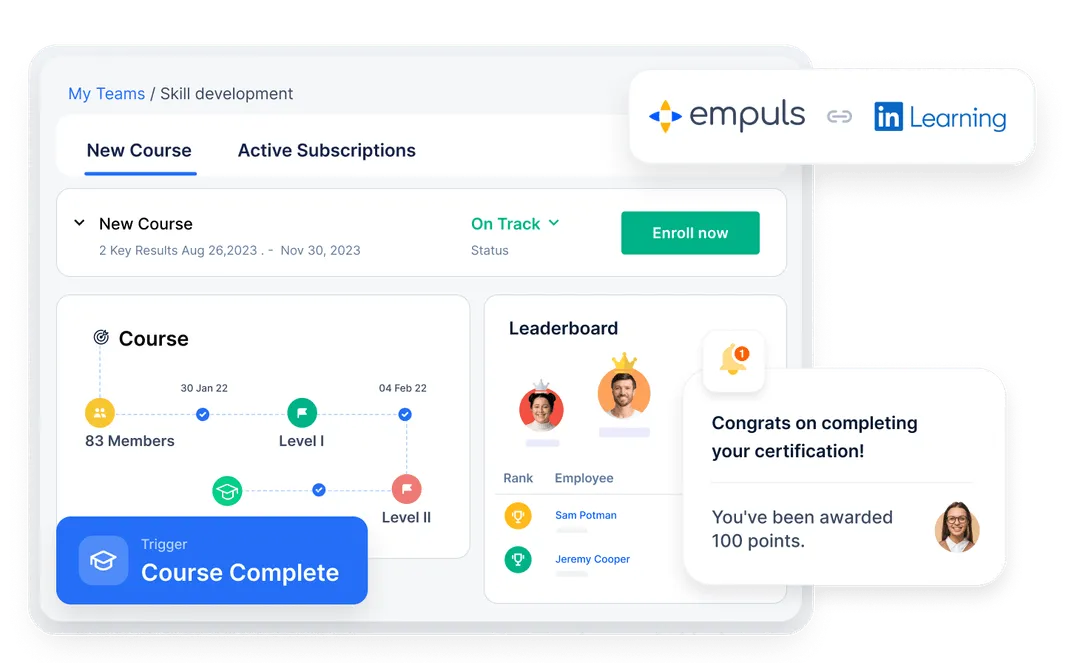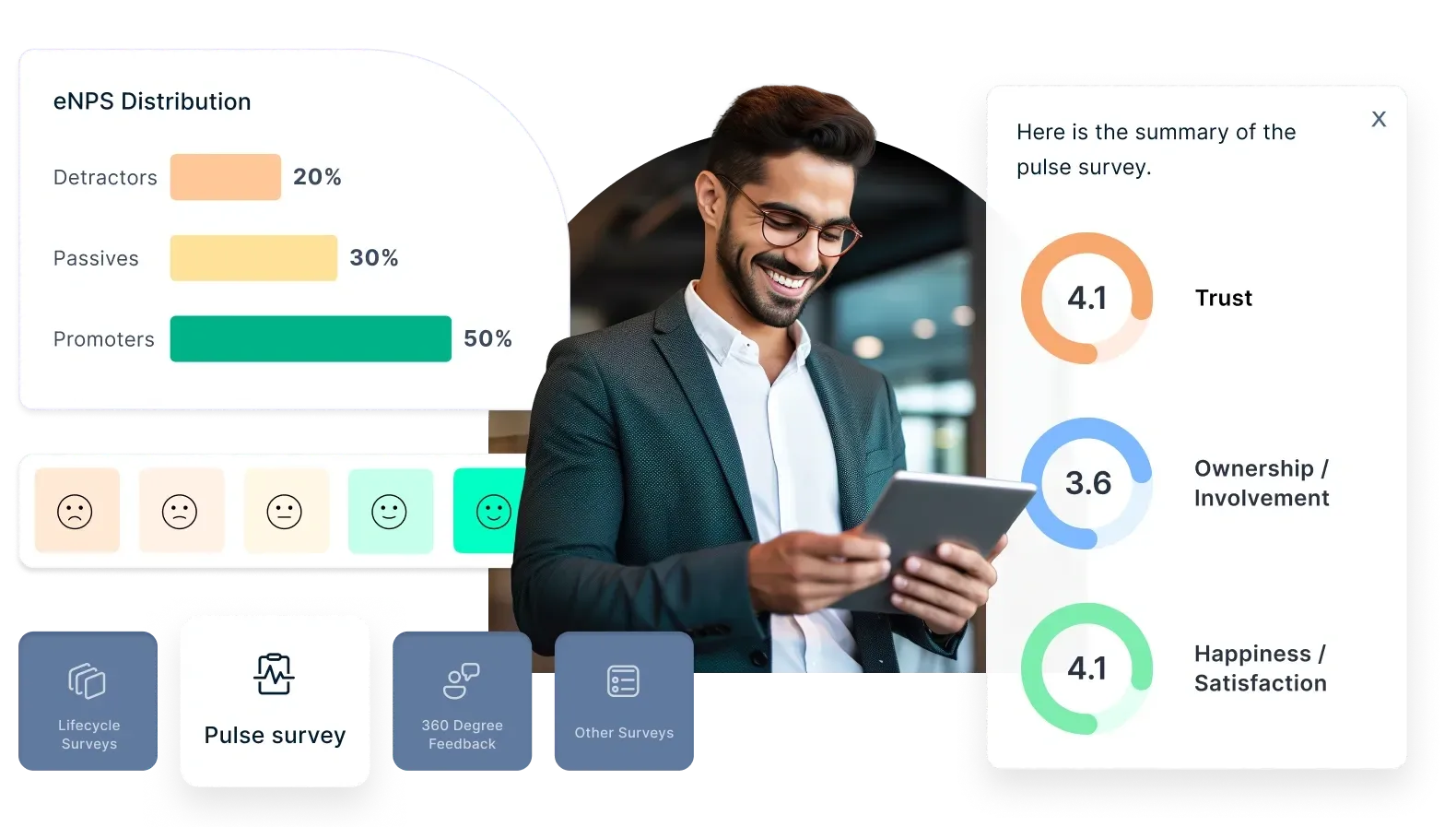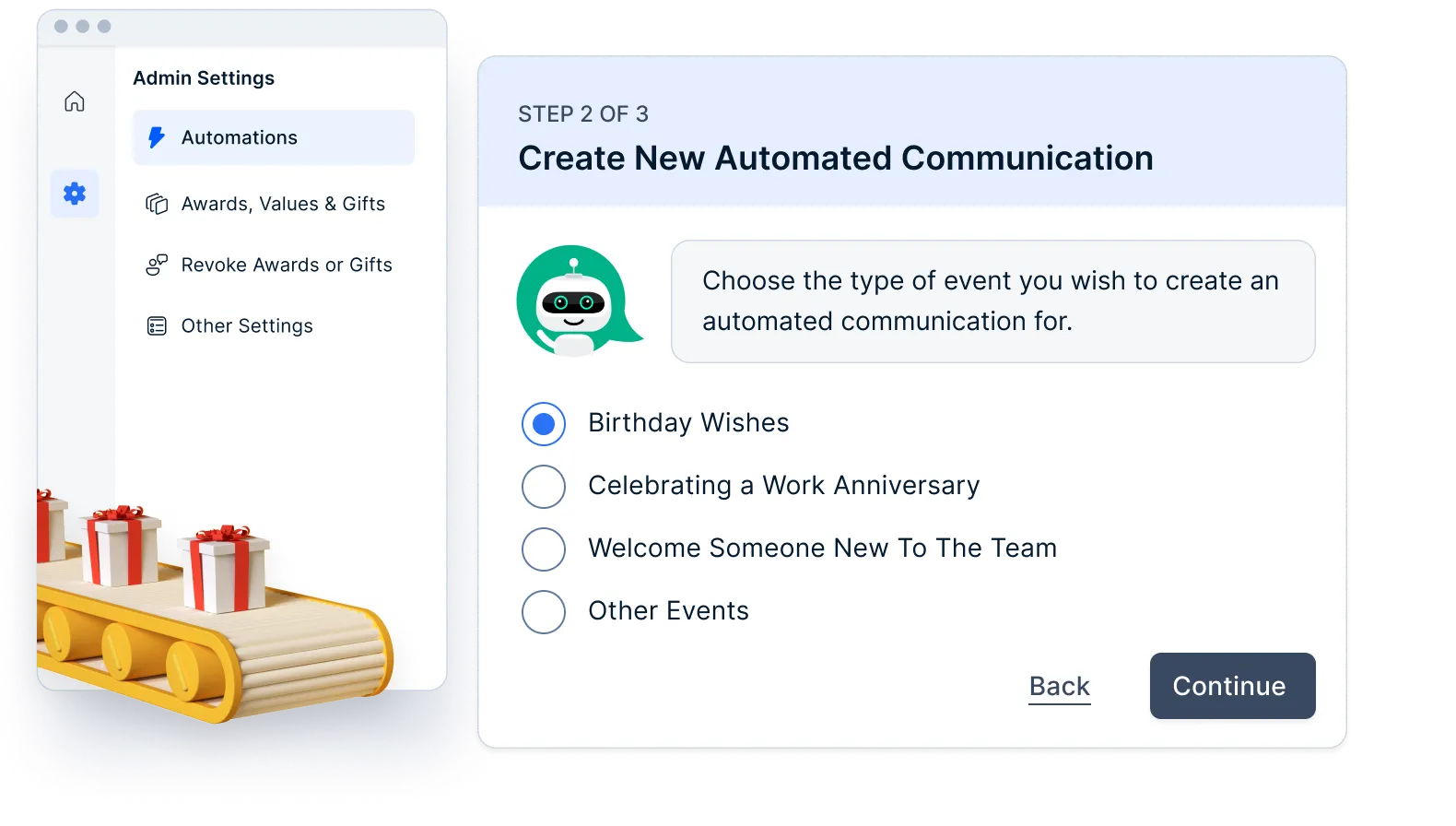Employee Satisfaction: Key Factors & Strategies to Improve Workplace Happiness
Employee satisfaction plays a crucial role in motivation, retention, and productivity. Learn about employee satisfaction factors, benefits, and strategies to create a happier and more engaged workforce.
On this page
If a single metric could represent the results of an organization's people management efforts–this metric will be Employee Satisfaction. While metrics like attrition and absenteeism are critical to measuring the health of the people management systems, these are lagging indicators of HR efficiency.
For this very reason, employee satisfaction is also the most extensively studied occupational phenomenon globally. A well-designed and well-implemented employee satisfaction survey can predict turnover and aid to pre-empt it.
What is employee satisfaction?
Employee satisfaction means how satisfied or happy your employees are with their job. It is the level of contentment and enthusiasm employees feel towards their job.
This article intends to understand employee satisfaction from an organizational culture standpoint, its determinants, and how to measure it effectively.
What drives employee satisfaction?
While organizations often focus on why employees leave, it's equally important to understand the factors that encourage them to stay. According to research, key elements that contribute to job satisfaction include:
- Meaningful work: Employees are more likely to remain in positions where they find the work engaging and aligned with their personal values.
- Recognition and rewards: Regular acknowledgment of achievements and fair compensation play crucial roles in employee retention.
- Career development opportunities: Access to training and clear paths for advancement motivate employees to commit long-term.
- Supportive management: Effective leadership that fosters open communication and provides support enhances job satisfaction.
- Positive work environment: A culture that promotes collaboration, respect, and work-life balance contributes to higher retention rates.
By focusing on these aspects, organizations can create jobs with the highest satisfaction, leading to reduced turnover and a more committed workforce.
Employee satisfaction and organizational culture
In his book 'The Changing Culture of a Factory,' Dr. Elliott Jaques coined the first mention of culture from the perspective of an organization in the year 1951. Back in its day, this book intended to explore the set of values that organizations need to nurture to gain total commitment from their people.
He invented the term' requisite organization' that he defined as an organization 'with a list of organizational values' that achieves 'doing business with efficiency and competitiveness' by 'release of trust and satisfaction in its employees.
Trust and satisfaction have since been constant evaluation subjects for people management. The requisite organization theory proves that organizational culture is a controllable determinant that affects employee satisfaction.
Eventually, a myriad of research studies in the 1990s and the 2000s proved a clear statistical correlation between Employment Satisfaction and Organizational culture. Ivana Petrovic's 2016 exploratory study identified nine organizational factors that lead to job satisfaction.
Below given are nine factors and the subcategories of aspects covered during the study:
Factor 1: Conditions of work
- Availability of information necessary to perform work well.
- Absence of tension and pressure on employees.
- Clear work organization with the precise division of work tasks.
- Safe working conditions.
- Physical working conditions.
- Objective evaluation of individual performance.
- Absence of tension and pressure at work.
- Promotion based on clear and known criteria.
- Respect for employee rights.
- Clearly defined work tasks and responsibilities.
- Opportunity to take initiative at work.
- Fair standards in defining salaries.
Factor 2: Relations between colleagues at work
- A friendly atmosphere at work.
- Good communication between colleagues.
- Good relations between colleagues.
- Support provided by colleagues.
- Absence of conflict between employees.
- Competent and reliable colleagues.
- Absence of tension and pressure on employees.
- Help and support from managers in performing work tasks.
Factor 3: The job itself
- Challenging and exciting job.
- A stimulating job with few routine tasks.
- Opportunities for traveling abroad on business.
- Job content, activities within the work.
- Opportunity to take initiative at work.
- Opportunities for professional development and training.
Factor 4: Company’s significance
- Company in a field of business important to society.
- Company’s public image and reputation.
- A high degree of discipline.
- Informing employees on the general state of affairs in the company.
- Reporting employees on the news in different parts of the company.
- Opportunities to get different benefits.
Factor 5: Managers
- Highly competent managers.
- Managers who respect employees and are open to their suggestions.
- Good organizational skills of the manager.
- Availability of the manager to his/her subordinates.
- Help and support from the managers in performing work tasks.
Factor 6: Compensation system
- Compensation system in which the employees’ salaries depend on their level of expertise.
- A compensation system that does not discriminate according to the part of the organization in which the employee works.
- Compensation system in which salaries depend solely on achieved results.
- Salary equal to the invested effort.
- Fair criteria in defining salaries.
Factor 7: Rewarding results and creating conditions for achieving them
- Compensation system in which salaries depend solely on achieved results.
- Fair criteria for determining wages.
- Compensation system in which salaries depend on the level of expertise.
- Salary equal to the invested effort.
- A compensation system that does not discriminate according to the part of the organization in which the employee works.
- Amount of salary.
- Promotion based on clear and known criteria.
- Opportunities for professional growth and training.
- Objective evaluation of individual performance
- Quality introductory training.
- Appreciation and acknowledgment by the managers of a job well done.
- Clear work organization with the precise division of work tasks.
- Good cooperation between different organizational units.
Factor 8: Company as a support
- A company that employees can rely on if they get into trouble
- Opportunities to get different benefits.
- The company cares about its employees.
- Employees kept informed about the general state of affairs in the company.
- Company in a field of business important to society.
- Company’s public image and reputation.
- Respecting employees’ rights is defined in the collective labor contract.
- Informing employees on the news in different parts of the company.
- A job that does not require overtime work.
Factor 9: Basic work conditions
- Safe working conditions.
- Physical working conditions.
- Availability of the necessary work assets and equipment.
- Availability of information required for performing quality work.
Apart from these, following are a fact about employee’s personal attributes as well that helps in employee satisfaction.
Employee’s personal attributes and employee satisfaction
While the organizational culture impacts employee satisfaction, employee satisfaction is another determinant. During their research in 1993, Brown and Peterson found that in addition to culture as an organizational variable, the other antecedent of satisfaction is the employees’ characteristics and their role perceptions.
It was 13 years later when in 2006, Markus Christen, Ganesh Iyer, and David Soberman created their model for job satisfaction. This is one of the most referred to and benchmarked organizational research studies on employee satisfaction. This model aimed to clarify ambiguities surrounding the concepts of work relationships and unify all independent studies relating to this.
This job satisfaction model spoke of how the work relationship concepts are correlated to each other.
It proved the following correlations between job performance, job satisfaction, (individual’s) efforts, (individual’s) ability, company productivity, job factors, role perception, and compensation:
- The effect of job performance on the employee’s job satisfaction is positive and highly significant.
- Job performances increase with an increase in efforts and/ or increased employee's inability.
- Company productivity increases with job performance.
- The effort is negatively correlated with job satisfaction.
- Compensation is directly and significantly correlated to job satisfaction.
- Positive job factors positively affect effort and job satisfaction.
- Positive role perceptions positively affect effort and job satisfaction
How to increase job satisfaction in the workplace?
Here are twelve ways to increase job satisfaction regardless of the differences between a job and a career.
1. Set clear expectations
A survey by Gallup revealed that only 26% of employees felt they could maintain a healthy work-life balance. Ensure that your employees are not overworked, stressed, or overwhelmed as a manager. Be it a job or career, be mindful of your assigned tasks, even if you lead an ambitious team.
When employers regularly conduct employee engagement and lifecycle surveys, they get to gauge the employee’s pulse. Empuls allows organizations and HR teams to configure surveys for the employee lifecycle, including onboarding, wellness, learning, and exit.
You can also set the questions, anonymity, and audience to spot irregularities and areas that need attention. Data-driven tips for improvement help leaders and managers act proactively
2. Recognize good work
Managers must take time to make the team members feel seen and appreciated. Remember to celebrate small wins and bigger accomplishments and offer positive feedback.
Even during remote working, you should brainstorm ways to appreciate and recognize employees for their work authentically. The reason is that most employees don’t feel they get enough praise. Leaders have an enormous scope to make employees proud of their work.
Workplace Intranet, Empuls allows managers to give the team and individual praise. Consider specifying the task, project, and impact your employee had, which made you recognize and celebrate the good work.
Hewlett Packard Enterprise (HPE) motivates its employees by publicly recognizing their contribution to the company on social media.
3. Focus on long-term goals
When teams and employees have visibility on the organization's long-term goals, vision, and strategy, employees can connect with the goals. They can understand how they can contribute to achieving the eye, leading to increased job satisfaction.
Make your team members feel they are a part of the bigger picture. Show them that you value their inputs by inviting their feedback.
4. Have an open channel of communication
Constant communication is crucial for building relationships in a job and career. Open communication ensures that important information does not get missed. Lead by example when creating a culture of open and honest communication.
As a manager, when you communicate your feelings, others feel safe expressing theirs. At all times, provide visibility into the information you have.
Frequently check in with your team to stay connected both personally and professionally. The Social Intranet feature from Empuls helps remove the silos and keeps everyone connected. This way, leaders and managers can align employees to a shared goal, news, and information
5. Care about your employee’s well-being
Whether it is a job or a career for an employee, one way to increase employee motivation is by showing that you genuinely care about their well-being. That includes motivating them to achieve their fitness milestones and even encouraging them to disconnect when they feel burned out.
Encourage managers to check on the team with 1-on-1’s for building a meaningful connection before jumping into work discussion. Healthy and happy employees will be efficient and satisfied.
6. Give them opportunities to learn
When employees stop learning, they will consider a job change for stimulation. Managers must encourage employees to hone their skills by attending conferences, webinars, and events. Keep the mindset of curiosity and learning high for interns doing a job and employees building a career.
The connect and align feature of Empuls enables you to speak with employees about their goals and objectives. When you know what they want to focus on, give them the information, resources, and job training for upskilling.
The Connect and Align feature of Empuls allows you to engage with employees about their goals and aspirations. Once you understand their focus areas, provide them with the necessary information, resources, and job training to support their upskilling.

Whether they are completing a training module, earning a new certification, or mastering a complex skill, motivate and incentivize them to invest in their professional and personal growth.
With personalized rewards and recognition, organizations can empower employees to take charge of their learning journey, fostering excellence and driving both individual and organizational success.
7. Share feedback frequently
Whether an employee considers their work a job or a career, they crave feedback. This can help them be more efficient, work smarter and improve performance. When you give constructive feedback, they will value the time and effort you put in. Ensure that your feedback and inputs are phrased correctly to be well-received.
Constructive and healthy feedback sessions, done monthly or quarterly, are ideal.
8. Measure the engagement and employee satisfaction
The key is to host pulse surveys or eNPS frequently. Annual surveys aren’t enough anymore. Improving company culture requires an agile approach.

Pulsate with Empuls
Empuls has pulse surveys that help managers measure real-time employee engagement through eNPS. Listening and understanding employee feedback helps in turning it into actionable insights.
9. Employee discounts
Employee discounts are a crucial perk that everyone appreciates. They could be in the form of formidable deals for the team on medicines, apparel, grocery, and merchandise.
Be it a job or a career, these discounts and rewards reduce attrition and improve productivity. They give your workforce an added advantage of working with you.
Microsoft gives a range of perks listed on its career page to help employees live healthy lives.
10. Foster relationships for better collaboration
Whether it is a temporary job for an employee or a career, having positive relationships propel overall job satisfaction. Managers can take a step ahead and encourage employees to bond about common hobbies even outside of work.
After all, strong, trustworthy relationships fuel better collaboration and build team trust. When people work better together, the business also runs better. Facilitate better connections between people in your team.
11. Provide a long-term career path
Help your employees plan for their long-term success. This shows that you are committed to seeing them progress, and you are willing to invest in their career growth. Help them map out their career goals to transition from a job to a career.
12. Rewards, recognition, and performance bonus
While monthly salaries are alright, great things happen when rewards and recognition are in the books. There is a direct relationship between rewards and the increase in efforts and results. For a motivated workforce, link their performance with monetary rewards and engage them in efficiently accomplishing the tasks.
The importance of performance bonuses is highlighted by IRF, which found team incentives to increase productivity by as much as 44%.
Using Empuls, you can automate the process of rewards and recognition to build a culture of appreciation. Empuls simplifies rewards and recognition by automating the process, ensuring a seamless and engaging experience for employees.

- Custom workflows: Automate awards in employee recognition programs with structured workflows.
- Flexible approval processes: Include nominators, moderators, jury panels, or multiple approvers for a fair and transparent system.
- Recognition triggers: Set up automated recognition for special events and milestones, ensuring timely appreciation.
By leveraging automation, Empuls helps organizations create a culture of appreciation, boosting job satisfaction and fostering a motivated workforce.
How to measure employee satisfaction?
Measuring employee satisfaction effectively helps organizations identify areas for improvement and maintain high levels of job satisfaction. Below are several proven methods:
Employee job satisfaction survey
Conducting regular employee job satisfaction surveys is one of the most effective methods to assess how satisfied employees are with their roles, management, work environment, and overall company culture. Surveys can identify strengths and highlight areas requiring attention, guiding actionable strategies for improvement.
One-on-one meetings and feedback sessions
Regularly scheduled one-on-one meetings allow for candid discussions about employees' satisfaction levels. Managers can directly gauge how employees feel about their roles, workload, and professional growth opportunities, providing insights that might not surface in broader surveys.
Analyzing employee turnover and retention rates
High turnover or declining retention rates often indicate low job satisfaction. Regular analysis of these metrics can help management understand underlying issues and promptly address factors contributing to dissatisfaction.
Evaluating productivity and engagement levels
Engaged and productive employees typically experience high job satisfaction. Monitoring productivity, quality of work, and participation in company activities provides indirect indicators of satisfaction levels.
Exit interviews
Exit interviews can provide candid insights into why employees choose to leave, highlighting potential issues related to job satisfaction. This information helps organizations proactively make necessary changes to retain existing talent.
By consistently applying these measurement strategies, businesses can ensure sustained high job satisfaction, positioning themselves to foster an engaged, motivated, and successful workforce.
Conclusion
Whether the employment is a job or a career, the best leaders and managers improve employee engagement, motivation, and overall job satisfaction. An employee engagement software such as Empuls can assist in uncovering employee insights to pull the right engagement drivers to build a highly engaged workforce.
Concluding with the golden words of Henry Ford from the last century that holds even now, “Whether you think you can, or you think you can’t, you’re right. It all starts with doing what is necessary, then what is possible, and suddenly you are doing the impossible.”
FAQs
1. Which four sources contribute to job satisfaction?
The four key sources of job satisfaction are:
- Work environment – A positive and supportive workplace.
- Compensation and benefits – Fair pay and perks.
- Job role and responsibilities – Meaningful and fulfilling tasks.
- Work-life balance – Flexibility and manageable workload.
2. What is the meaning of job satisfaction?
Job satisfaction refers to the level of contentment employees feel about their work, which affects their motivation, performance, and overall well-being.
3. What are the seven dimensions of job satisfaction?
The seven dimensions include:
- Pay and benefits
- Work conditions
- Job security
- Career growth opportunities
- Work-life balance
- Relationship with colleagues
- Management and leadership support
4. What are the six major sources of job satisfaction?
The six major sources are:
- Compensation and benefits
- Work environment
- Job security
- Career growth and development
- Recognition and appreciation
- Work-life balance


















